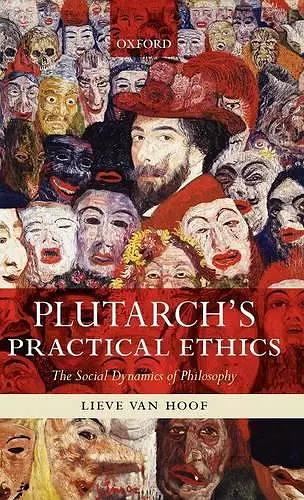Plutarch's Practical Ethics
The Social Dynamics of Philosophy
Format:Hardback
Publisher:Oxford University Press
Published:24th Jun '10
Currently unavailable, and unfortunately no date known when it will be back

The Second Sophistic (c.AD 60-250) was a time of intense competition for honour and status. Like today, this often caused mental as well as physical stress for the elite of the Roman Empire. This book, which transcends the boundaries between literature, social history, and philosophy, studies Plutarch's practical ethics, a group of twenty-odd texts within the Moralia designed to help powerful Greeks and Romans manage their ambitions and society's expectations successfully. Lieve Van Hoof combines a systematic analysis of the general principles underlying Plutarch's practical ethics, including the author's target readership, therapeutical practices, and self-presentation, with five innovative case studies. A picture emerges of philosophy under the Roman Empire not as a set of abstract, theoretical doctrines, but as a kind of symbolic capital engendering power and prestige for author and reader alike.
A testimony to Van Hoofs impressively extensive reading, not only in the field of Plutarch studies, but widely in the areas of social studies, both ancient and modern, thus bestowing on her work a most impressive breadth of perspective Van Hoofs analysis is most enlightening. All in all, Van Hoof has produced here a most useful addition to Plutarch studies, one that should both provoke debate and direct more sympathetic attention to this area of Plutarchs work. * J. Dillon, Bryn Mawr Classical Review *
This eminently readable study succeeds admirably in bringing a range of Plutarchs writings to life The authors attention to the full range of Plutarchs strategies, and not merely to the relation between these texts and Plutarchs more technically philosophical works, unlocks many fresh insights. * G. Reydams-Schils, Gnomon *
Van Hoofs attention to details in style and content makes her book a valuable contribution to scholarship, as well as adding persuasiveness to her portrait of Plutarch. Her exposition is well-structured, clear, and avoids overly technical discussions of style or long diversions. * D. Dentsoras, Journal of the History of Philosophy *
This is an excellent book for Plutarch scholars or for those who want to pull Plutarch off the shelf and blow off the dust. Summing Up: Highly recommended. * J.L. Miller, CHOICE *
Various attempts have been made by modern scholars to define and analyze that group, and Lieve Van Hoof's is the latest - and in many ways the most successful - of such attempts. * J. Lamberton, Classical World 105 (2012) *
This is undeniably a groundbreaking interpretative approach to Plutarch's ethical philosophy... This is a well-researched and meticulous piece of scholarship which succeeds in its aim of rehabilitating Plutarch's works of practical ethics by compellingly arguing against the label 'popular-philosophical'. * K. Oikonomopoulou, The Classical Review 62 (2012) *
Van Hoof's most striking achievement is to show how these works tend to respect the world of honour in which so many of Plutarch's readers would have been immersed; that sets him apart from most other philosophical writers from the same period and before. * J. König, The Journal of Hellenic Studies 132 (2012) *
these are wide-ranging treatises carefully formulated to appeal to elite readers, portraying philosophy as an indispensible tool in achieving the goal of living a successful life. * F. Klotz, Mnemosyne 65 (2012) *
Il volume di L. Van Hoof è sicuramente un buono studio, che porta avanti una ricerca più che meritevole da diversi punti di vista Tale analisi - proprio perché considera la sofisticata operazione filosofica di Plutarco all'interno del contesto socio-culturale in cui si è sviluppata - ha il grande merito di far emergere una differente immagine di Plutarco. * A. Corti, Philosophical Readings 4 (2012) *
ISBN: 9780199583263
Dimensions: 223mm x 144mm x 33mm
Weight: 564g
328 pages